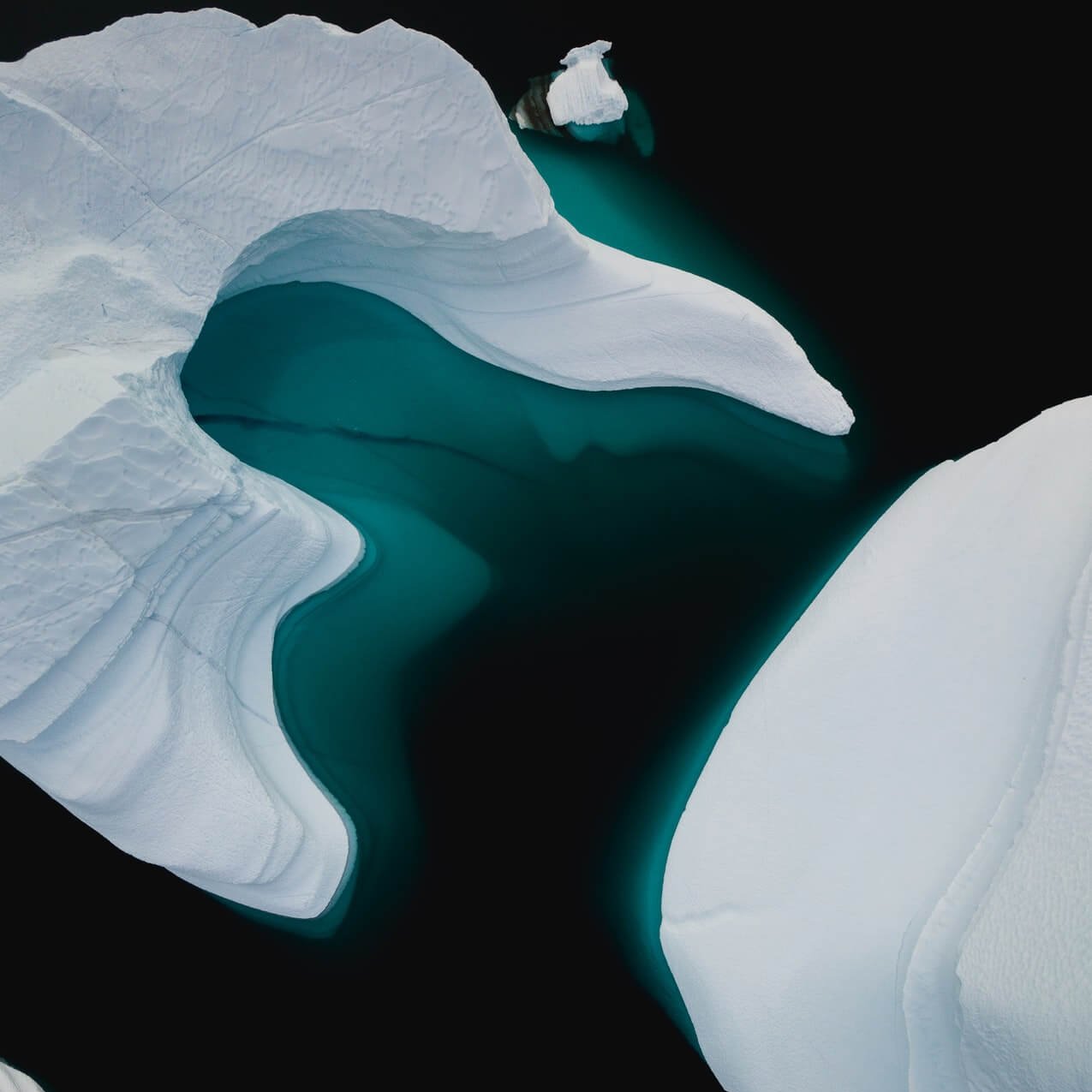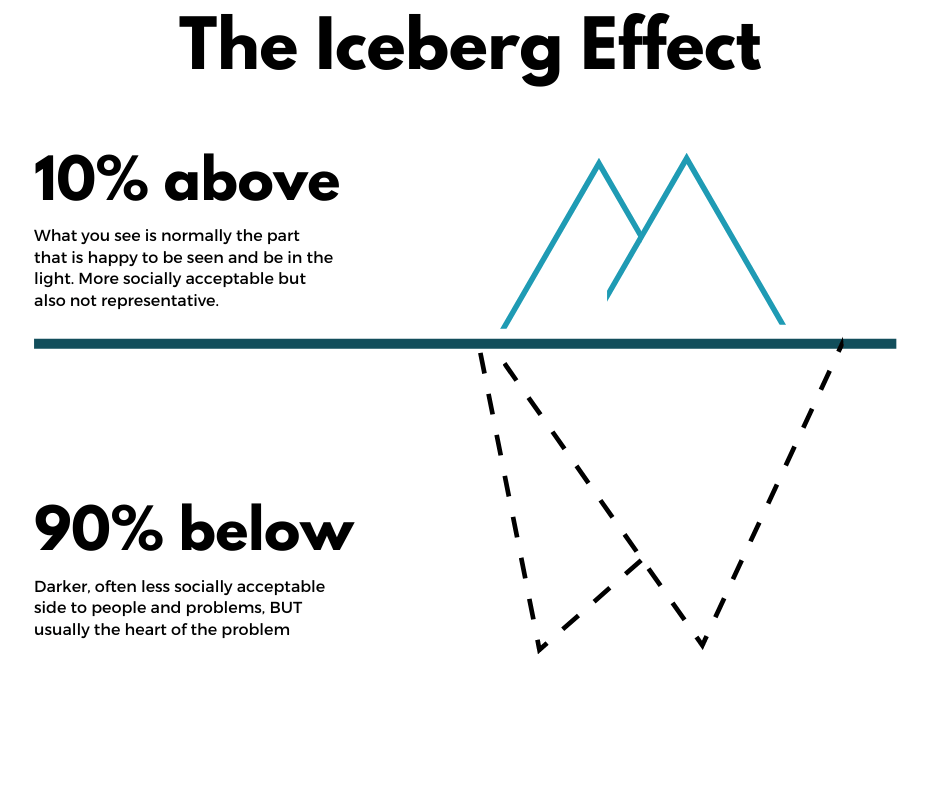
The Iceberg Effect
The thing about an iceberg is that 90% of it is under water.
Though without knowledge of icebergs, you wouldn’t even realise that so much lies beneath the surface. All your photographs, recounts and recollections will show is the 10% above the water, the part which you assume to be the whole.
This is what I call The Iceberg Effect or The Iceberg Problem; the simple reality that for any individual, group or problem, most people will process information, make judgments and react prematurely based on the 10% of the information they see above the surface.
The 10% above the water is not just any 10%, but the section that is most socially acceptable or most comfortable in the light. The real depth and core prefers to be beneath the filter, known as the surface, preferring the dark and the cold.
But it is here where real substance tends to live, or where the heart of the issue lives undetected.
Pretty much every problem is like an iceberg in this way. The reality is, if you fail to understand 90% of a problem, what hope do you have of solving it? What problems will you miss? Where will you imagine issues that aren’t really there? Finally, when will you actually do more harm than good because of this Iceberg problem?

Diagram of the Iceberg Effect
Why the 90% remains unseen
The 90%, or whatever relevant portion that lies dormant and unseen, is typically discounted from appraisals and problem-solving strategies. The mind is made to have ideas, not hold them, and has a limit in terms of its cognitive load – The Iceberg Effect is our brain’s attempt to make the world easier to process, but unfortunately easier does not always mean better.
The Tomato Story
Ernesto Sirolli is the founder of Enterprise Facilitation. He took a radically different approach to aid and impact after seven years without progress working for Italian NGO’s in Africa. His Tomato Story very adequately sums up this failure.
When he and his colleagues were working in Zambia, they took advantage of the rich African soils to plant tomatoes. These tomatoes grew to be twice their regular size (due to the rich soil) and would provide a source of food for the Zambian community.
From the perspective of Ernesto and his Italian NGO, it was a no-brainer. They simply assumed that the Zambian community did not have the savvy to develop agriculture on their own.
All seemed well until one night, a swarm of hippopotamus came out of the river and devoured the entire field of tomatoes.
“Why didn’t you tell us about the hippos?” The disheartened Italians bellowed
“You didn’t ask” replied the Zambians
Lessons from the Tomato Story
What do we learn from the Tomato Story? Many things, one of which is that we presume too much.
I love the quote from Tom Watson, formerly of IBM:
“I’m no genius, but I’m smart in spots, and I stay around those spots.”
You’d be surprised to know who said the following line: “I have no special talent. I am only passionately curious.”… none other than Albert Einstein! No special talents Albert?
You see, Einstein is quite famous for wise self-criticism and the challenging of his own ideas. He’s inspired millions, including the great Charlie Munger, who said:
“It’s remarkable how much long-term advantage people like us have gotten by trying to be consistently not stupid, instead of trying to be very intelligent.”
It was Anthony De Mello who uttered “Our great tragedy my dears is that we know too much, we think we know, that is our tragedy, so we never discover”.
The lesson is that the greats all share an awareness of how limited their knowledge is, and they instead live in a mode of eternal curiosity.
If our greatest investors, business leaders and scientists emphasise how little they know, then how can we continually claim to know what’s best?
Unpacking more psychology for The Iceberg Effect
Making snap judgments clearly served our ancestors well. After all, they lived in an environment with much more immediate danger, and much simpler decisions.
See tiger? Run. Hungry? Hunt.
But as we have evolved cognitively, our environment has become more complex… it is now difficult for natural selection to keep up.
Among our many psychological tendencies, we have the inclination to hide and suppress so much. We hold back what we really think to avoid offending people, to retain our place in the group and to avoid any presentation of weakness.
To that end, communication is rarely efficient. As in the Tomato Story, so much truth is accidentally with-held from basic conversation. As such, we get the very robust filter of the surface.
Our minds are not designed to look at things scientifically and critically, they are designed to make quick decisions that enable us to navigate physical and social survival. We over-value the tangible and fatally discount the intangible.
What are the costs of this?
Ineffective international aid over the course of generations.
‘Mental health’ and unexplained suicide epidemics.
War, hatred, racism, religious discrimination… to say the least.
This is why acknowledging the Iceberg Effect is so important. We need to appreciate that all people and issues represent an intricate latticework of icebergs. We need to be willing to put our heads beneath the very cold surface to examine thoroughly.
And if we aren’t willing to do this, we should, like Watson, Einstein and Munger, stick otherwise in the spots we are already smart in.
A call for understanding, not judgment.
“What you’ve judged, you cannot understand” said Anthony de Mello.
I find this such a powerful idea. As soon as we point a finger or assign a label, we’ve already lost. De Mello also said
“We’re always fixing things aren’t we? never strikes us that things don’t need to be fixed… they need to be understood”
When you look this proposition square in the eye, what do you see?
What downside do you see in training yourself to judge-almost-never and seek understanding forever?
Join the Intentional Sharing Movement, where we change the world by sharing things worth sharing. If this piece would ‘open a door’ for someone you know, please share it.
Don’t just read! Discuss today’s idea so we can benefit off your wisdom. Sign up for conversations that matter below so you can contribute to more conversations and ideas.





